Related Research Articles
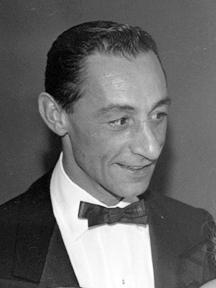
George Edward Arcaro was an American Thoroughbred horse racing Hall of Fame jockey who won more American classic races than any other jockey in history and is the only rider to have won the U.S. Triple Crown twice. He is widely regarded as one of the greatest jockeys in the history of American Thoroughbred horse racing. Arcaro was born in Cincinnati, Ohio, the son of an impoverished taxi driver. His parents, Pasquale and Josephine, were Italian immigrants and his father held a number of jobs, including taxi driver and operator of an illegal liquor enterprise during Prohibition. Arcaro was born prematurely, and weighed just three pounds at birth; because of this, he was smaller than his classmates and was rejected when he tried out for a spot on a baseball team. His full height would reach just five-foot, two inches. Eventually nicknamed "Banana Nose" by his confreres, Arcaro won his first race in 1932 at the Agua Caliente racetrack in Tijuana, Mexico; he was 16 years old. In 1934, the inaugural year of Narragansett Park, Arcaro was a comparative unknown who rode many of his early career races at 'Gansett.

Mr. Prospector was a Thoroughbred racehorse who became an outstanding breeding stallion and notable sire of sires. A sprinter whose career was cut short by repeated injuries, he won seven of his 14 starts, including the Gravesend Handicap at Aqueduct Racetrack and the Whirlaway Handicap at Garden State Park.
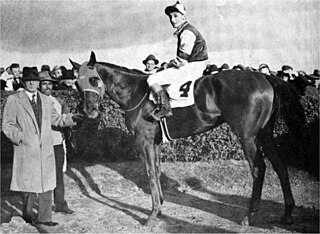
Assault was a champion American Thoroughbred racehorse who is the seventh winner of the American Triple Crown and the only Texas-bred winner of the Triple Crown.

Spectacular Bid was a champion American Thoroughbred racehorse who won the 1979 Kentucky Derby and Preakness Stakes. He holds the world record for the fastest 10 furlongs on dirt, and also broke several track records. He won 26 of his 30 races and earned a then-record $2,781,607. He also won Eclipse Awards in each of his three racing seasons.
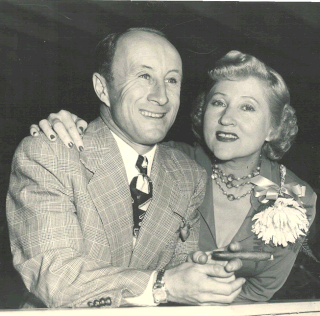
James Stout was an American Hall of Fame thoroughbred horse racing jockey who won four Triple Crown races.

John R. Velazquez is a Puerto Rican jockey in Thoroughbred horse racing. He began his career in Puerto Rico and moved to New York in 1990. In 2004 and 2005 he was the United States Champion Jockey by earnings and both years was given the Eclipse Award for Outstanding Jockey. He was inducted into the Horse Racing Hall of Fame in 2012, rode his 5,000th winner in 2013, and became the leading money-earning jockey in the history of the sport in 2014.

Frederick J. Taral was an American Hall of Fame jockey.

Joseph A. Notter was an American Hall of Fame Champion jockey and winner of two of the American Classic Races.
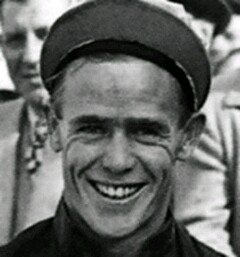
Albert Snider was a jockey in Thoroughbred racing who had success in his native Canada as well as the United States.

The Sheepshead Bay Race Track was an American Thoroughbred horse racing facility built on the site of the Coney Island Jockey Club at Sheepshead Bay in Brooklyn, New York.
Walter Blum was an American jockey who won 4,382 races in a 22-year career. Blum received the George Woolf Memorial Jockey Award for being the best jockey of 1964. He won the 1971 Belmont Stakes as the jockey of 34-1 long shot Pass Catcher, which prevented Canonero II from winning the Triple Crown. He was inducted into the International Jewish Sports Hall of Fame in 1986, and the following year into the United States Racing Hall of Fame.
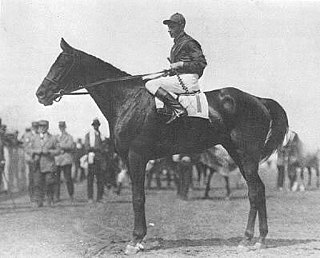
Albert M. Johnson was an American Hall of Fame jockey and trainer. Born in the rural community of Milan, Washington, Albert Johnson began his career in 1917 at Playfair Race Track in nearby Spokane.
Victorian (1925–1934) was an American Thoroughbred racehorse that was bred in Kentucky. He was bred and raced by Harry P. Whitney and is best known as the winner of the 1928 Preakness Stakes in which he was ridden by future Hall of Fame jockey Sonny Workman.

Wayne Danforth Wright was an American Hall of Fame and National Champion Thoroughbred horse racing jockey who won all three of the Triple Crown races in different years.

In the United States, the Triple Crown of Thoroughbred Racing, commonly known as the Triple Crown, is a series of horse races for three-year-old Thoroughbreds, consisting of the Kentucky Derby, Preakness Stakes, and Belmont Stakes. The three races were inaugurated in different years, the last being the Kentucky Derby in 1875. The Triple Crown Trophy, commissioned in 1950 but awarded to all previous winners as well as those after 1950, is awarded to a horse who wins all three races and is thereafter designated as a Triple Crown winner. The races are traditionally run in May and early June of each year, although global events have resulted in schedule adjustments, such as in 1945 and 2020.
William Norris Boland is an American retired Hall of Fame jockey and trainer in Thoroughbred horse racing.
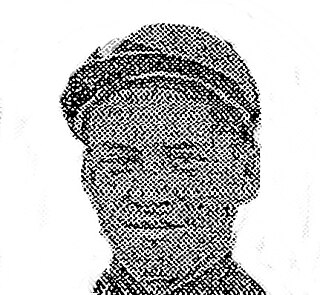
Eddie Dugan was a jockey in Thoroughbred horse racing who won three American Classic Races and two Canadian Classic Races. In addition, Dugan raced and won in Russian Empire.
Frank Robinson was an American Champion Thoroughbred horse racing jockey.

Head Play was an American Thoroughbred racehorse best known for winning the 1933 Preakness Stakes, the second leg of the U.S. Triple Crown series of races and as the horse on the losing end of the "Fighting Finish" of the 1933 Kentucky Derby.
Grenada was an American Thoroughbred racehorse. He won the 1880 Preakness Stakes, Belmont Stakes, and Travers Stakes. He is one of only seven horses to have won these three races.
References
- ↑ "Famous Jockeys". The Daily Alta California, page 5, Volume 41, Number 13556. 1886-10-11. Retrieved 2020-08-06.
- ↑ "1876 Belmont" (PDF). belmontstakes.com. 1876-06-10. Archived from the original (PDF) on 2011-10-07. Retrieved 2020-05-17.
- ↑ "1883 Kentucky Derby Results Tables" (PDF). Archived from the original (PDF) on 2011-07-23. Retrieved 2010-07-26.
- ↑ "The Baltimore Races". New York Times . 1887-05-14. p. 2. Retrieved 2021-05-18.
- ↑ "Races at Sheepshead Bay". Chicago Inter Ocean, page 6. 1884-06-11. Retrieved 2021-05-18.
- ↑ "History of Suburban Handicap". Daily Racing Form at University of Kentucky Archives. 1942-05-31. Retrieved 2021-05-17.
- ↑ "Seagram Stable Pays $25,000 For Rolls Royce". Daily Racing Form at University of Kentucky Archives. 1926-05-10. Retrieved 2021-02-17.
- ↑ "Won By Preakness Horses". New York Times. 1892-07-29. p. 3. Retrieved 2021-05-17.
- ↑ "Havre De Grace Notes". Daily Racing Form at University of Kentucky Archives. 1936-04-22. Retrieved 2019-04-12.